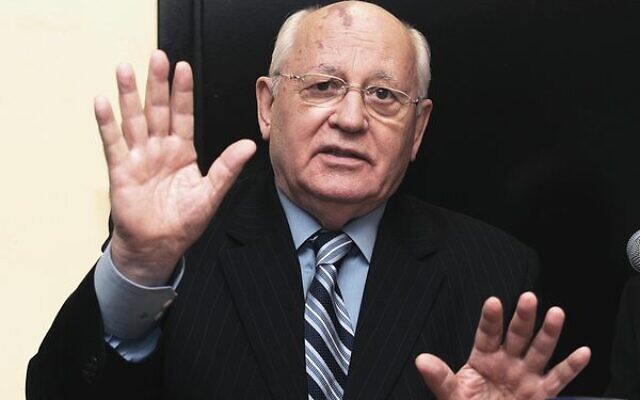Mikhail Gorbachev dies
'The World Jewish Congress mourns the death of Mikhail Gorbachev, a great statesman, an advocate for freedom and human rights, and a true friend of the Jewish people ...'
Mikhail Gorbachev, who as the last leader of the Soviet Union waged a losing battle to salvage a crumbling empire but produced extraordinary reforms that led to the end of the Cold War, died on Tuesday. He was 91.
The Central Clinical Hospital said in a statement that Gorbachev died after a long illness. No other details were given.
Kremlin spokesman Dmitry Peskov said in a statement carried by Russian news agencies that Russian President Vladimir Putin offered deep condolences over Gorbachev’s death and would send an official telegram to Gorbachev’s family in the morning.
Though in power less than seven years, Gorbachev unleashed a breathtaking series of changes. Thousands of “refuseniks” – Jews forbidden from emigrating – were finally able to leave the Soviet Union, many to Israel, under his tenure. But the changes he instituted quickly overtook him and resulted in the collapse of the authoritarian Soviet state, the freeing of Eastern European nations from Russian domination and the end of decades of East-West nuclear confrontation.
His decline was humiliating. His power hopelessly sapped by an attempted coup against him in August 1991, he spent his last months in office watching republic after republic declare independence until he resigned on December 25, 1991. The Soviet Union wrote itself into oblivion a day later.
Many of the changes, including the Soviet breakup, bore no resemblance to the transformation that Gorbachev had envisioned when he became Soviet leader in March 1985.
Yet Gorbachev may have had a greater impact on the second half of the 20th century than any other political figure.
“I see myself as a man who started the reforms that were necessary for the country and for Europe and the world,” Gorbachev told the AP in a 1992 interview shortly after he left office.
“I am often asked, would I have started it all again if I had to repeat it? Yes, indeed. And with more persistence and determination,” he said.
Gorbachev won the 1990 Nobel Peace Prize for his role in ending the Cold War and spent his later years collecting accolades and awards from all corners of the world. Yet he was widely despised at home.
Reacting to news of his death, World Jewish Congress president Ronald S Lauder said, “The World Jewish Congress mourns the death of Mikhail Gorbachev, a great statesman, an advocate for freedom and human rights, and a true friend of the Jewish people who through his actions enabled countless Soviet Jews to return to their heritage. I extend my deepest condolences to his family.”
Gorbachev never set out to dismantle the Soviet system. What he wanted to do was improve it.
Soon after taking power, Gorbachev began a campaign to end his country’s economic and political stagnation, using “glasnost” or openness, to help achieve his goal of “perestroika” or restructuring.
In his memoirs, he said he had long been frustrated that in a country with immense natural resources, tens of millions were living in poverty.
Once he began, one move led to another: He freed political prisoners, allowed open debate and multi-candidate elections, gave his countrypeople freedom to travel, halted religious oppression, reduced nuclear arsenals, established closer ties with the West and did not resist the fall of Communist regimes in Eastern European satellite states.
But the forces he unleashed quickly escaped his control.
With Times of Israel, AP


comments